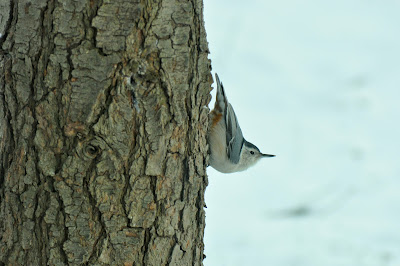Red-breasted Nuthatch
Nuthatches, that is. Our part of the planet hosts only two of the four
possible nuthatches in this country, the Red-breasted and the White-breasted.
Well, in an attempt to be totally accurate, I have to toss in the Brown
Creeper, making it five species in two genera. The creeper is in the
Certhiidae genera, so … well, it’s complicated.
Our more common nuthatch is the white breasted. I know there are
reports of red breasteds nesting in the region, our yard on the edge of the
Cuyahoga Valley National Park, is not one of those spots. Consequently, when we
see the first Red-breasted Nuthatch of the season, usually early fall if we’re
lucky, we’re out doing the happy dance in hopes he’ll stick around through the
winter before heading back north to Canada, his usual habitat.
This season we’ve had a pair of red breasteds, along with several white
breasted and, much to our enjoyment, a Brown Creeper, hanging out at the
feeding station. Even a black and white bird manages to stand out on a snowy
day. The creeper, one of the better camouflaged birds around is more often
heard than seen.
White-breasted Nuthatch
The three species are easy enough to sort out by their distinctive
color patterns and shapes. In the twilight or early morning, or when the
lighting is not good, you can separate the nuthatches from the creepers by the
way they climb trees. Nuthatches move head down (usually), feeding on insects
or stashing sunflower seeds. The creeper works its way from the bottom of the
tree, up, using its tail as a prop, much like woodpeckers. And, as if it
matters, there’s the size thing: red breasteds are the more diminutive of the
three, measuring about 4.5 inches in body length. Creepers come in at about
5.25 and the white breasted is the giant at 5.75 inches.
We’ve added peanuts to our feed offerings this winter and have
discovered that either red or white goes fine with peanuts.
Brown Creeper




No comments:
Post a Comment